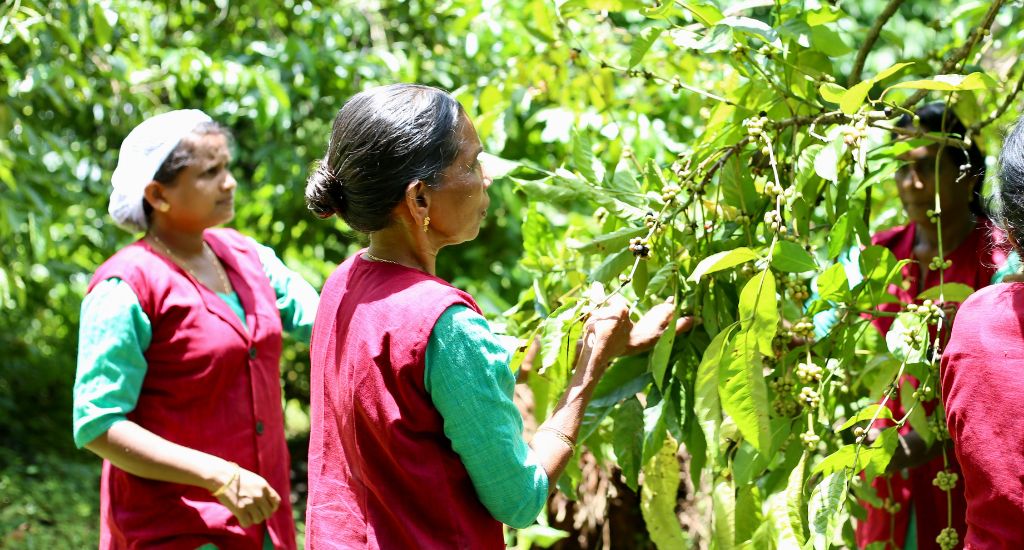
Kerala women brew cups of joy with artisanal coffee
A coffee brand created by five women from Pinavoorkudi tribal village in Kerala has grown to become a trusted and favourite blend of beans.

A coffee brand created by five women from Pinavoorkudi tribal village in Kerala has grown to become a trusted and favourite blend of beans.
A cup of joe is a joy forever, but let’s face it y’all: the perfect coffee is a brew that tells something about the people producing it. To know more, Kuttampuzha Kappi (coffee) from Kerala is a must pourover.
It all begins in a symphony of nature’s grandeur in Kuttampuzha, Kerala’s sprawling panchayat in Ernakulam district, where emerald jungles embrace rolling hills, rivers serenade the land and waterfalls cascade like liquid silk. It’s a tribal landscape, sustaining a zen-like sense of calm.
Amidst this picturesque tableau, the ethereal aroma of kaapi (coffee), that sacred elixir of the morning, becomes an imperative companion for anyone soaking up the scenery in Kerala.
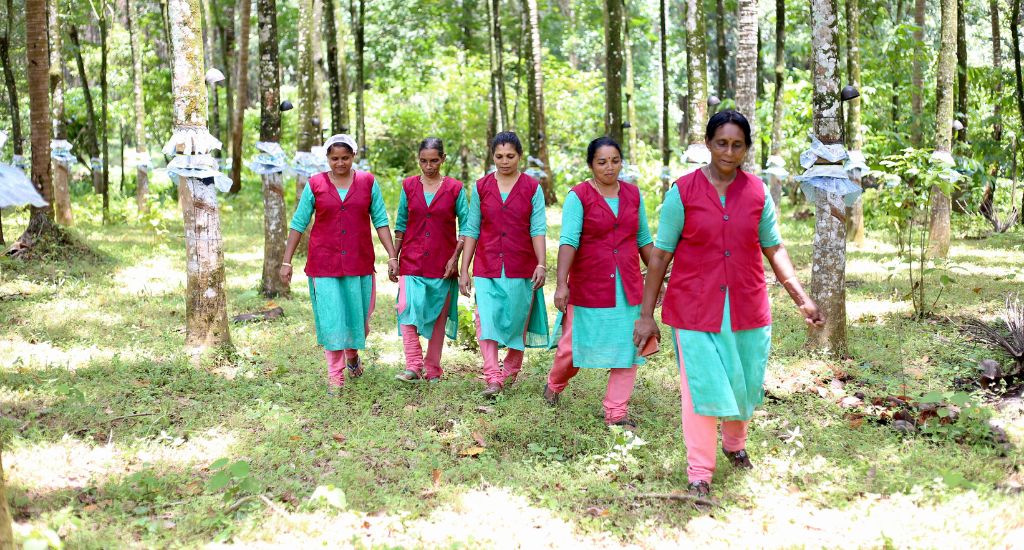
Kuttampuzha Kappi is an artisanal Kerala coffee brand managed by a group of enterprising women from the tribal village of Pinavoorkudi within the panchayat. Here, cocoa, arrowroot and coffee thrive, both as part of the ecosystem and the local cuisine.
This collective of five women specialises in producing finely ground coffee from meticulously handpicked beans. They have united their efforts to introduce the enticing aroma of their robust coffee to a wider audience with the help of Kudumbashree – a Kerala government-initiated network of self-help groups created for poverty alleviation and women’s empowerment. They are part of the Roopasree micro enterprise at Kuttampuzha.
In 2019, the five women – Ramani Chakravani, Bindhu Santhosh, Kamalakshi, Sandya Shaibu and Usha Vijayakumar – gave wings to their longstanding aspiration of venturing into the coffee business in Kerala. While Ramani is 62 years old, the others are in their late forties or early fifties.
Also Read: In pictures: Coffee cultivation at an unlikely place
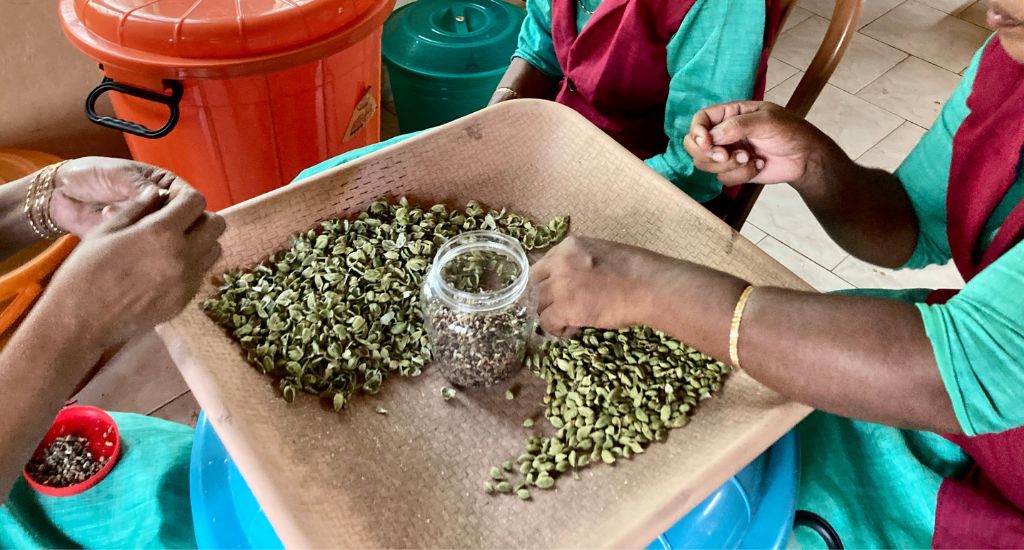
During the early stages of their endeavour, the women got much-needed support from their family members who spread the word around about their business. This helped them get initial buyers – mainly the vendors in nearby towns.
“One way or the other, somebody always has to take the lead. Otherwise, an enterprise will not work,” Ramani said. “Also, businesses need support from knowledgeable people. So we always appreciate and welcome guidance from others, which improves us immensely.”
Unfortunately, their business faced disruption due to the Covid-19 pandemic, leading to a hiatus in production throughout 2020. However, in 2022, they regrouped, doubling their coffee production and forging collaborations with neighbouring farmers.
They obtained support from the panchayat, which provided them space to set up a small factory. To facilitate expansion, the entrepreneurs collectively raised most of the required capital. Each member took an individual loan of Rs 6,000 from Kudumbashree.
Also Read: Upland farmers shift to coffee for better prospects
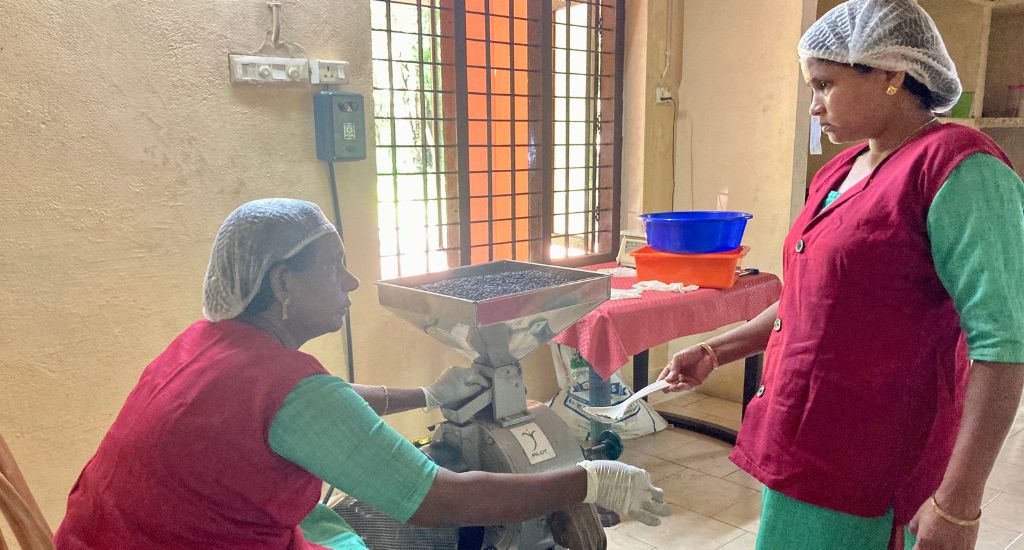
Since then, production has doubled, with demand continuously on the rise. The women are now able to produce and sell more than 50kg of coffee every 2-3 months on average. Also, they have ventured into leasing coffee plantations in their neighbourhood, located within the forested region.
“By harvesting matured seeds directly from these farms, we have eliminated the need to purchase beans externally, ensuring consistent quality,” said Ramani.
These women deliver a buzz based exclusively on caffeine, with nary a drop of chicory to be found. It is primarily a single blend. The precise components of their subtle, medium-blend coffee powder, apart from cardamom, remain a well-kept secret.
The creators acknowledge that it is a blend of natural ingredients inspired by traditional methods. Taste-conscious consumers praise its purity and authenticity, and also the assurance of it being free from artificial preservatives.
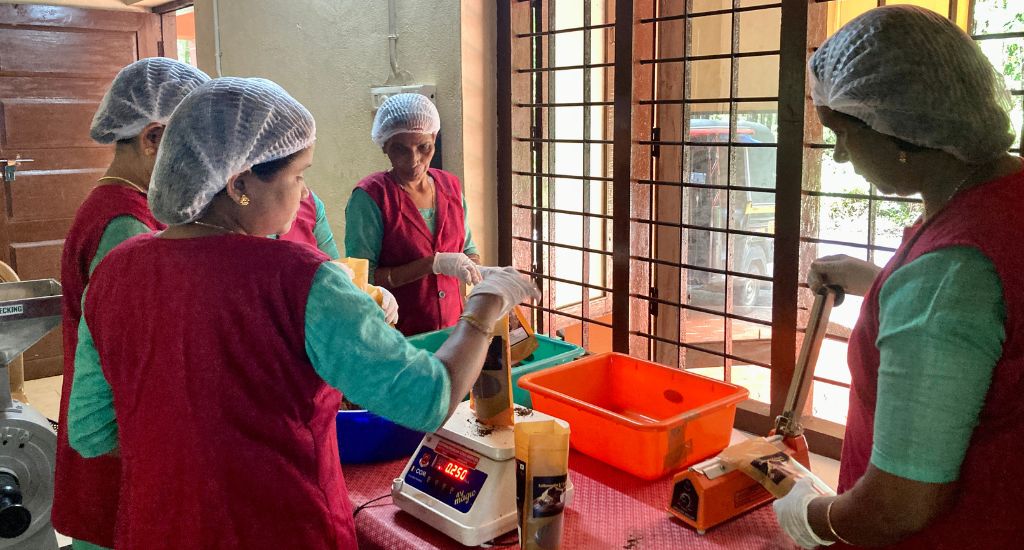
With their fully operational unit, the business is experiencing steady growth. In 2023 so far they have participated in over 10 expos, including the annual village festival Oorattam.
Also Read: Sustainable farming: Kerala village women sow seeds of change
While they discourage bulk orders, they deliver individual retail packages, available in 100g and 250g sizes, across India. With the guidance of mission coordinators, they have ventured into online marketing on the Kudumbashree Bazaar website.
The Kudumbashree chapter of Kuttampuzha boasts several successful business models, but the Roopashree micro-enterprise unit stands out as the most acclaimed, thanks to the teamwork of its members.
“Roopashree unit came into existence in 2000. As we are one of the best performing units, we now have more than Rs 5 lakh credit eligibility,” Ramani said. “Before we started focusing only on coffee, we leased land to cultivate vegetables and some fruits. We also had milch animals, mostly cows, and sold the milk.”
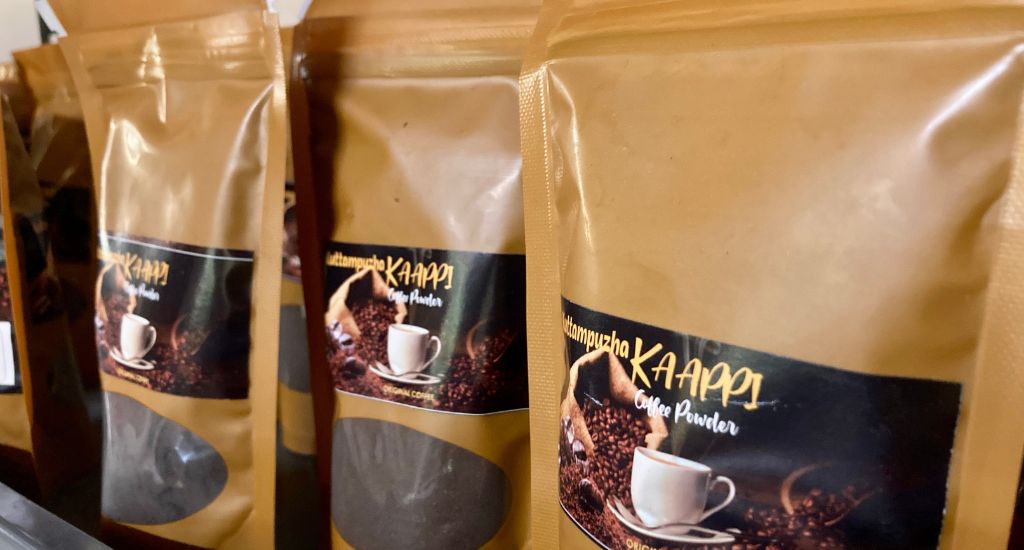
Ramani reminisces that maintaining cohesive teamwork among all 17 members of the Roopasree unit for a new business endeavour was challenging. Nonetheless, she, along with four others, persevered to transform Kuttampuzha Kappi into a reality.
Thanks to their recent upgrades, they have saved a considerable amount of money, labour and time. Their grinding machine has a rated capacity to produce 25kg of powder an hour. Prior to acquiring the machine, coffee beans were ground externally. In the initial stages, they would harvest, dry and roast coffee beans in their homes. Ramani, who doubles as a three-wheeler driver, would then transport the roasted beans to town for grinding and primarily sell it through Kudumbashree markets.
Also Read: Why Kerala needs revival of Kaipad rice
All members participate in skill development, learning to operate and maintain machines through training provided by Kudumbashree. And learn about the types of beans, temperatures and techniques. No detail is too small. They now plan to set up a processing unit to facilitate bulk coffee production, build a roastery and make improvements in storage facilities.
Unlike start-ups that prioritise market trends and profits, these women place a higher premium on the efficient utilisation of their natural resources. Nevertheless, they acknowledge that they face challenges stemming from climate variations and seasonal changes. Frequent encounters with marauding elephants pose a threat to farmlands in the area. However, these women continue to harmonise with Mother Nature, aspiring for the aroma of their coffee to transcend borders and bloom further.
The lead image at the top shows the women picking coffee beans. (Photo by Aneesh Mathew)
Aneesh is Bengaluru-based a knowledge management and communications specialist who has several years of experience as a freelance journalist.